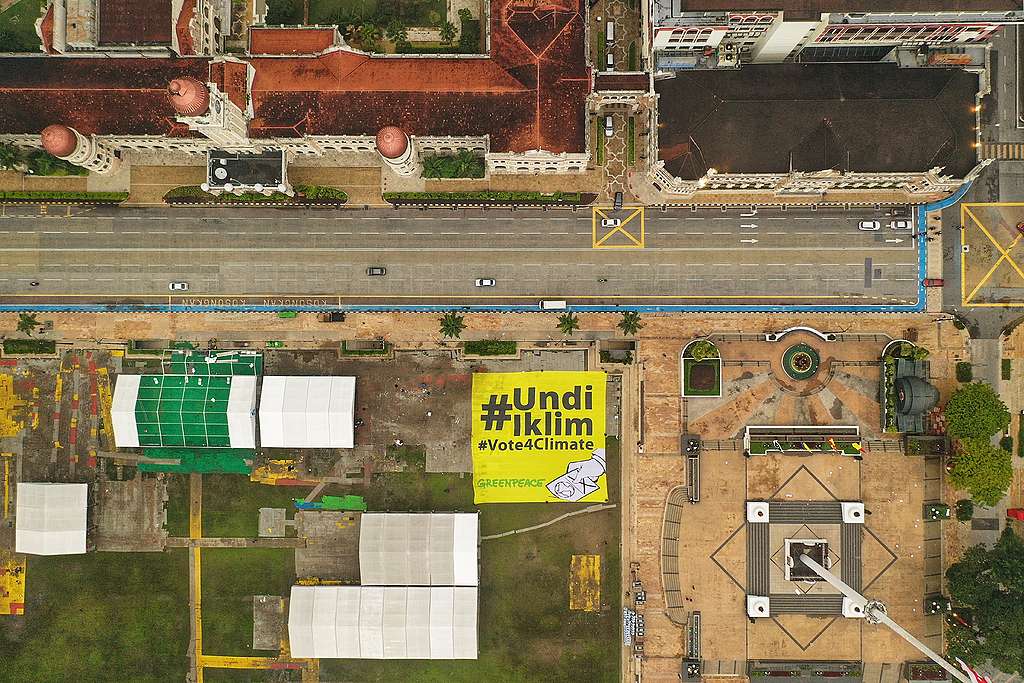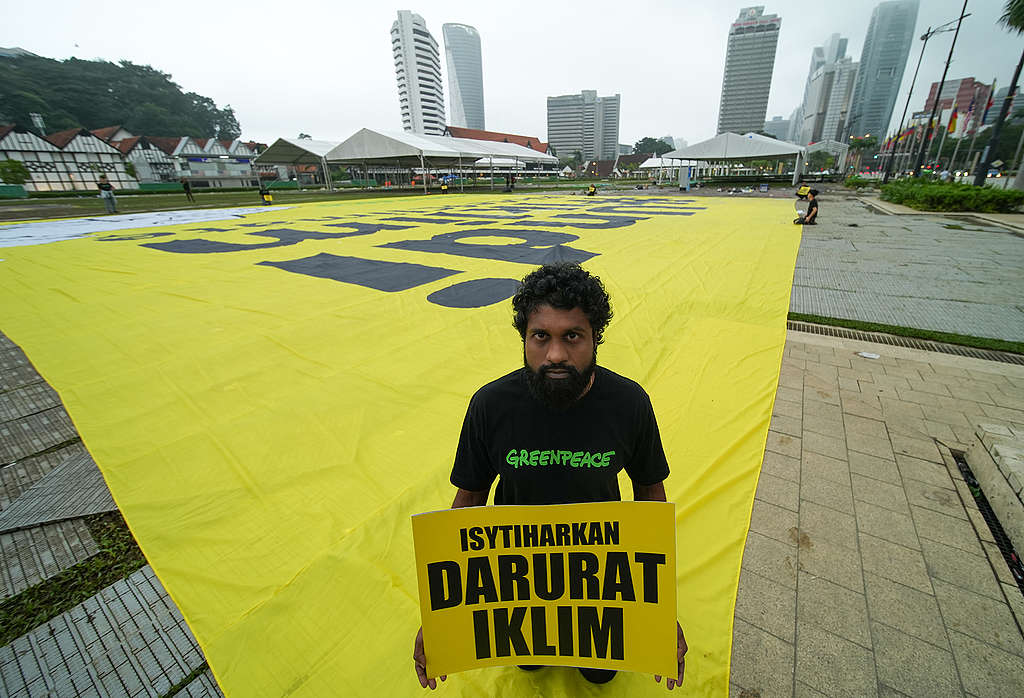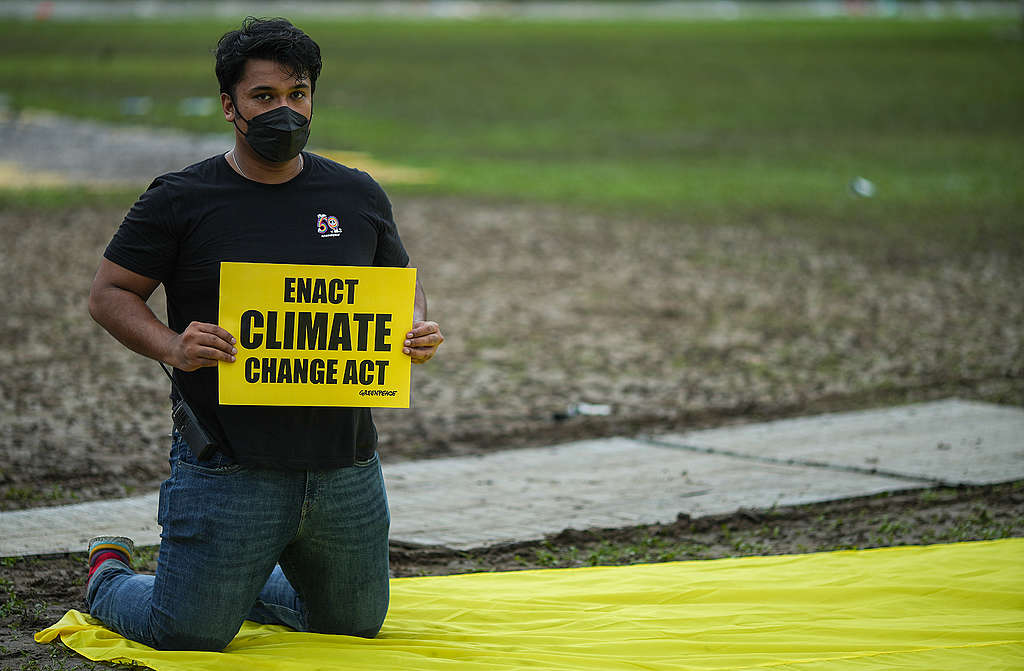This is entirely the personal opinion of the writer and does not necessarily represent the views of any organisation in particular.

Greenpeace Malaysia has been conducting an in-depth study on what the Malaysian members of parliament (MP) have said in parliament and in the media on environmental topics between 2018 to 2022. As a researcher for this project, I searched news media from the past 4 years to identify MPs’ public statements, commitments, reported actions, and positioning related to climate change and the environment. The following is my personal opinion based on months of research.
One of the most prominent takeaways from analysing MPs in the media is regarding flooding. Flash floods and the plight of Malaysians who are affected are a highlight of discussions in the media amongst a large number of our politicians. Given the seriousness of this matter, one would think that the PM and UMNO would be focusing on flood prevention and mitigation efforts instead of calling for a general election. Instead, they have collectively ignored the scientific links between climate change, deforestation and flooding, and found it appropriate to hold the general elections in the midst of the monsoon season.
Although the amount of focus and attention our politicians have shown on the topic of flood seems admirable, it is disappointing that only a small number of them have mentioned climate change as a reason behind it. Most politicians focus on blaming poorly designed drainage systems, clogged drains, and rivers. While there is no denying that this contributes to the detrimental effect of flash floods, they should also focus on questioning why we are witnessing the increase in flooding in the first place. It is clear that more floods are occurring now than in previous years. Studies have projected that flooding in Malaysia will continue to get worse with continued global warming. Meanwhile, the government has claimed to have spent billions of ringgit on flood relief aid initiatives. In addition to giving money after the disasters occur, politicians should be more vocal about how we can prevent increasingly severe flooding through climate mitigation measures.

As taxpayers’ money is being spent on flood relief, Malaysians are meanwhile still suffering from repeated flood disasters and threats of worsening flash floods without effective mitigation strategies. According to the Auditor-General’s Report, flood mitigation measures that were set out to be addressed between 2018 to 2022 under the Kuala Lumpur City Hall’s (DBKL) master plan have yet to be accomplished. The report highlights that the flash floods continue to reoccur even after a number of so-called mitigation projects had already been implemented. The report further states damning evidence relating to noncompliance of procurement principles and variations in contract issuance suggesting questionable oversight and enforcement.
Based on the media statements made by our politicians, we can already get a glimpse into why this issue has not been addressed more urgently. We have politicians from the ruling government (prior to parliament being dissolved) such as Zahid Hamidi (BN-UMNO) who said that the unpredictability of the floods was a good reason to hold GE15 now so that the welfare of the people could be taken care of by a stronger and stable government. We have Abdul Latif (PN-PAS) who said that floods were “unexpected” and “shouldn’t be politicised.” Reportedly he had also previously said that the National Disaster Management Agency (NDMA) was not directly involved in dealing with natural disasters, such as floods at the state level. Meanwhile, Transport Minister Wee Ka Siong (BN-MCA) said in a New Year’s Eve message on Facebook: “It’s been a year full of challenges from the pandemic and the flood that affected so many of us. Together we will overcome these difficulties with the Keluarga Malaysia spirit.” Such statements made by politicians leave little hope that their parties could prevent worsening floods in the future.
On the other hand, a number of opposition politicians have made the link between climate change and flooding. We have Anwar Ibrahim (PH-PKR) who expressed that climate change – as well as poor awareness of the importance of the environment – will lead to a catastrophic increase in the likelihood of natural disasters in the future. He called for the Prime Minister to act by establishing a royal commission of inquiry as well as a parliamentary committee to improve the level of disaster preparedness. His daughter, Nurul Izzah (PH-PKR), was also seen highlighting the need for climate action, stating “We must continue to persevere not only in terms of preparing future-proof mitigation strategies to face increasingly severe climate events, but also in measuring the varying dimensions of poverty so that the programmes and policies designed are able to benefit the greatest number of individuals. Only recovery plans that are empathetic, comprehensive, and realistic are able to sufficiently safeguard the well-being of the rakyat”. We also have Hannah Yeoh (PH – DAP) who said: “Until and unless the federal government and their agencies, including Kuala Lumpur City Hall (DBKL), employ a sense of urgency in the way they treat this matter [flood mitigation], I want to see a moratorium slapped on all development proposals in the Segambut constituency surrounding the 10 flooded locations for the rest of this year.”

The most pertinent question Malaysians need to ask now is, who will suffer the worst effects of climate change? The truth is, it is the children and the young generation of Malaysians in the coming 20-30 years. Sadly, it is their voices that have remained subdued in the midst of one of the most unstable and volatile political environments Malaysia has seen yet. Meanwhile, voters are unsure how a so-called stable government that is being promised can be achieved. Blatant denial of responsibility, lack of transparency, and shifting of blame somehow seem acceptable to certain politicians. To date, we have no idea how the “Keluarga Malaysia” spirit is going to help resolve the issue of flooding or climate change. However, thankfully, there are some who clearly understand the urgency of the matter – that climate change is already upon us and it needs to be prioritised in order to secure a better future for our families and the upcoming young generation. Furthermore, it is promising that a new wave of younger voters registered from 18 years old can join at the polls on Saturday – hopefully they recognise the urgency and significance of getting out to vote.
It is now upon all of us to try and make a difference through the power of united voices speaking up for those who are not able to just yet. We owe a brighter future to the next generation, and this demands a government that will not only talk about floods, but also champion climate action and environmental protection as its utmost priority to prevent disasters from getting worse. As part of this, we need a government that will enact policies to phase out fossil fuel dependency and protect our forests, while implementing more green technology, renewable energy and cleaner air for all. And the choice is in our hands. #Vote4Climate.
